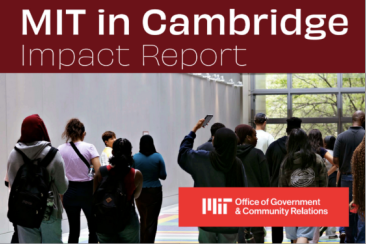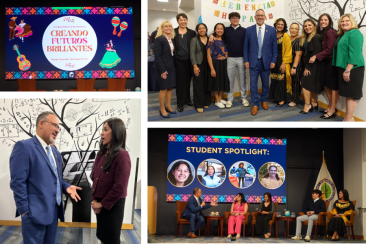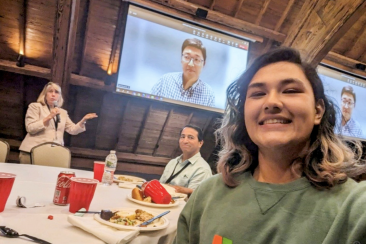THE LEMELSON-MIT PROGRAM AND BEYOND BENIGN INTRODUCE NEW JV INVENTEAMS ACTIVITY GUIDE ON GREEN CHEMISTRY

The JV InvenTeamsTM Green Chemistry Activity Guide encourages students to use green chemistry principles to invent bioplastics.
CAMBRIDGE, Mass., October 20, 2020 – Today the Lemelson–MIT Program, in collaboration with Beyond Benign, announced the launch of the Junior Varsity (JV) InvenTeams Green Chemistry Activity Guide. JV InvenTeams activity guides are free sets of curricula that are aligned with Next Generation Science Standards and designed to cultivate inventive curiosity and skills in sixth through tenth grade students traditionally lacking access to hands-on enrichment opportunities in science, technology, engineering and mathematics (STEM). The green chemistry guide is the ninth JV InvenTeams activity guide to be created and the first to be curated by both Beyond Benign and the Massachusetts Institute of Technology (MIT) community.
The launch of the new guide is synchronous with this week’s National Chemistry Week coordinated by the American Chemical Society, reinforcing the value of chemistry in everyday life by teaching students that green chemistry principles can be used to invent products and materials that reduce harmful impacts on humans and the environment. The guide demonstrates these principles and invites students to explore the life cycle of conventional petroleum-based plastics and consider how each stage of the life cycle could be improved upon to make the process more sustainable. Students are also asked to develop sustainable bioplastic prototypes made from benign materials. They use hands-on skills to measure and safely handle wet and dry materials, and formulate and optimize their bioplastics. The guide, available in both educator and student versions, has already been piloted in schools and encouragingly demonstrated to students that working with green chemistry can positively impact daily life and provide for a more sustainable future by addressing some of the biggest challenges plaguing society today.
High school student Ben Barnes, along with his teacher Loren Kristick, are from Energy Institute High School in Houston, Texas, one of the schools that piloted the Green Chemistry activity guide. “It was really interesting how much we were able to learn about this subset of materials that we call bioplastics,” said Barnes. “Throughout the course of this project we were able to learn how bioplastics are made, learn how they’re applied and actually in our seventh meeting, we were able to make a bioplastic prototype…and that honestly gave me a lot of hope about what individual people can do to combat the dire plastic crisis of today.”
Erin Mayer, a teacher at Casey Middle School in Boulder, CO will be working with the guide this year in order to explore green chemistry principles with her students. Mayer is the winner of a contest that Beyond Benign posed to teachers nationwide, asking them to write an essay or record a video explanation of how they hope inventing with green chemistry will impact their students’ learning. Mayer’s submission won her and her students a $425-valued classroom kit that supports the JV InvenTeams Green Chemistry guide. “I am so excited to implement green chemistry into all of our chemistry initiatives this year, including bioplastics, because my student learners will develop as forward thinking innovators and inventors,” says Mayer.
“We are very excited to collaborate with Beyond Benign on this new JV InvenTeams activity guide, especially because this guide focuses on such an important topic: sustainability,” said Stephanie Couch, executive director of the Lemelson-MIT Program. “The earlier we can impart the importance of developing skills in areas like green chemistry to invent in a more sustainable way, the better prepared students will be to tackle challenges today and into the future.”
“We are thrilled to launch this guide in partnership with the Lemelson-MIT Program,” said John Warner Co-Founder of Beyond Benign and a Founder of the field of Green Chemistry. “Chemistry is at the core of solving local and global challenges through the design of better molecular building blocks. This guide places students in the role of the inventor, allowing them to problem solve through chemistry.”
The Lemelson-MIT Program and Beyond Benign are supported by The Lemelson Foundation.
ABOUT THE LEMELSON-MIT PROGRAM
The Lemelson-MIT Program celebrates outstanding inventors and inspires young people to pursue creative lives and careers through invention. Jerome H. Lemelson, one of U.S. history’s most prolific inventors, and his wife Dorothy founded the Lemelson-MIT Program at the Massachusetts Institute of Technology in 1994. It is funded by The Lemelson Foundation and administered by the School of Engineering at MIT, an institution with a strong ongoing commitment to creating meaningful opportunities for K-12 STEM education. For more information, visit lemelson.mit.edu.
ABOUT BEYOND BENIGN
Beyond Benign, a 501(c)(3) nonprofit, envisions a world where the chemical building blocks of products used every day are healthy and safe for humans and the environment. Beyond Benign is fostering a green chemistry education community empowered to transform chemistry education for a sustainable future. Beyond Benign’s continuum of sustainable science educational programs including, teacher and faculty training, and curriculum development from K-20 are helping to build the next generation of scientists and citizens with the skills and knowledge to create and choose products that are safe for human health and the environment. For more information, visit https://www.beyondbenign.org/.
ABOUT THE LEMELSON FOUNDATION
The Lemelson Foundation uses the power of invention to improve lives, by inspiring and enabling the next generation of inventors and invention based enterprises to promote economic growth in the US and social and economic progress for the poor in developing countries. Established by prolific US inventor Jerome Lemelson and his wife Dorothy in 1992, to date the Foundation has provided or committed more than $175 million in grants and PRIs in support of its mission. For more information, visit http://lemelson.org.





